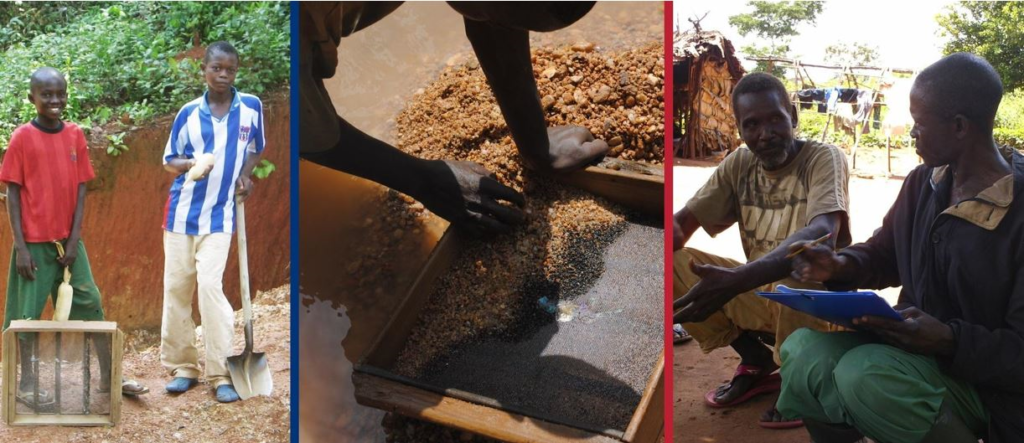ARTISANAL MINING AND PROPERTY RIGHTS (USAID AMPR) TASK ORDER UNDER THE STRENGTHENING TENURE AND RESOURCE RIGHTS II (STARR II) IDIQ
Executive Summary
 The USAID Artisanal Mining and Property Rights (AMPR) Year II workplan stipulated that under Objective II: Strengthen Community Resilience, Social Cohesion, and Response to Violent Conflict in the Central African Republic (CAR) and under Intermediate Result 2.1: Support Inclusive Community Dialogue Especially between Different Religious and Ethnic Groups to Resolve Conflict Over Land and Natural Resources In Compliant Zones the following deliverable: “Develop a roadmap that identifies key research questions and next steps for policymakers, academics, and practitioners to advance understanding and respond to conflicts (Contract Activity 2.1.3).”
The USAID Artisanal Mining and Property Rights (AMPR) Year II workplan stipulated that under Objective II: Strengthen Community Resilience, Social Cohesion, and Response to Violent Conflict in the Central African Republic (CAR) and under Intermediate Result 2.1: Support Inclusive Community Dialogue Especially between Different Religious and Ethnic Groups to Resolve Conflict Over Land and Natural Resources In Compliant Zones the following deliverable: “Develop a roadmap that identifies key research questions and next steps for policymakers, academics, and practitioners to advance understanding and respond to conflicts (Contract Activity 2.1.3).”
The following materials are submitted to demonstrate the advancement of the pastoralism activity under Component II. This report presents the following:
- Bibliography of key literature on pastoralism prepared by consultant Dr. Leif Brottem
- Pastoralism Roadmap of key research questions guiding field research carried out by sub-contractor Concordis International.
- Issues and Questions for a Research Agenda jointly prepared by Dr. Leif Brottem and Concordis International but in consultation with the AMPR project management team.
- Roadmap Master Class presentation offered to regional workshops in Nola and Berberati and to a national stakeholders’ workshop in Bangui in early January 2020.
The Component II activity continues at this time despite the COVID-19 situation. The sub-contractor, Concordis International carried out field work successfully as reported in the AMPR Weekly Updates in February 2020. Research findings are currently being written up for submission on June 30, 2020, but possibly earlier. Following the presentation of the report to national and regional actors, the AMPR project may decide to invest the resources in working with these stakeholders to develop an inclusive and participatory Action Plan based on these and other findings. The present and future impacts of COVID-19 may substantially influence future policy recommendations and AMPR could play a key part in facilitating these reflections. However, any follow-up will be spelled out in the AMPR Year III workplan.
1.0 Bibliography on Pastoralism in the Central African Republic
The bibliography of literature on pastoralism in the Central African Republic was prepared by consultant Dr. Leif Brottem to help guide the preparation of the central research questions. The full bibliography is listed in Appendix 1. Field research questions were in part derived from this literature review. Field research will either confirm and expand on these questions or contradict them. The preliminary questions were discussed in stakeholder meetings in Berberati, Nola, and Bangui in January 2020.
2.0 Pastoralism Road Map
The pastoralism roadmap as defined in the USAID AMPR Year II workplan “identifies key research questions and next steps for policymakers, academics, and practitioners to advance understanding and respond to conflicts.” The key issues and questions summarized in Annex 2 were derived from the literature review, as well as discussions held during workshops in Berberati, Nola, and Bangui in January 2020. These questions seemed particularly pertinent to workshop participants, which included representatives of regional and national authorities (ministries, sub-prefects, gendarmery), representatives of pastoralist organizations, MINUSCA, the AMPR staff, and others.
The workshops consisted of two presentations, one by Dr. Leif Brottem through his Master Class presentation on pastoralist issues in West and Central Africa. The second consisted of a presentation by Mr. Peter Marsden of Concordis International on the results of a similar type of research carried out in the prefecture of Ouham-Pendé (http://concordis.international/central-african-republic/). These two presentations were reviewed by participants with interest and many questions.
The workshop discussions generated additional issues and questions which were then integrated into the Corcordis International semi-structured interview guides and questionnaires. The preliminary roadmap questions prepared by Leif Brottem are presented in Annex 2.
Following the presentation of the final research report prepared by Concordis International, the report findings and recommendations will be presented to national government stakeholders and the local multi-stakeholder working groups (Contract Activity 2.1.3). Under the Year III workplan, further activities will be defined in light of the political, institutional and public health situation of the moment.
3.0 Master Class Presentation
The Master Class presentation of Annex 3 was presented to regional workshops in Berberati and Nola in early January 2020. Over 60 participants attended the day-long workshop facilitated by the AMPR Component II coordinator, Dr. Zéphirin Mogba. The presentation attached here was prepared prior to arrival by Dr. Leif Brottem in Bangui, but then subsequently modified after discussions with the AMPR and Concordis International teams. This presentation, as well as review of the work carried out by Concordis International in the Ouham-Pendé region, set the stage for small group discussions divided up into pastoralist interest groups, artisanal miner/farmer interest groups, and government/donor interest groups. Each group presented its own narrative of the realities they confront. This led to a plenary discussion of how narratives structure interpretations of facts with each party trying to construct a story to support its own position and special interests.
The workshop was a key mechanism for the Concordis International team to line up contacts for subsequent research.
This master class presentation was also delivered in Bangui, but to a small group of Ministry of Livestock and Ministry of Mines and Geology staff. The seminar summarized the key points of each of the regional workshops.

